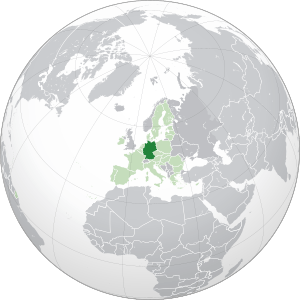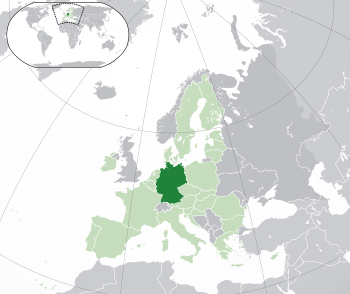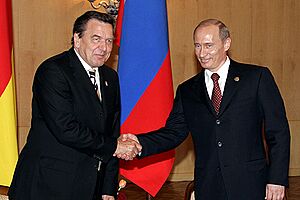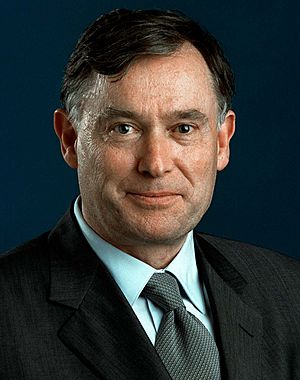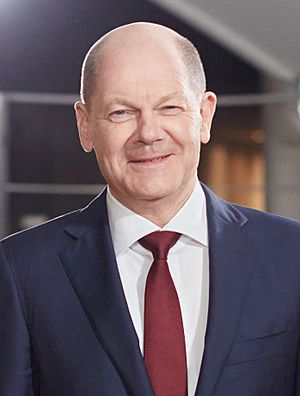History of Germany (1990–present) facts for kids
Quick facts for kids
Federal Republic of Germany
Bundesrepublik Deutschland (German)
|
|||||||||
|---|---|---|---|---|---|---|---|---|---|
|
Location of History of Germany (1990–present) (dark green)
– on the European continent (light green & dark grey) |
|||||||||
| Capital | Berlin 52°31′N 13°23′E / 52.517°N 13.383°E Bonn (seat of government, 1990–1999) 50°44′N 7°6′E / 50.733°N 7.100°E |
||||||||
| Largest city | Berlin 52°31′N 13°23′E / 52.517°N 13.383°E |
||||||||
| Official language | German | ||||||||
| Demonym(s) | German | ||||||||
| Government | Federal parliamentary republic | ||||||||
| Frank-Walter Steinmeier | |||||||||
| Olaf Scholz | |||||||||
| Legislature | |||||||||
| Bundesrat | |||||||||
| Bundestag | |||||||||
| Formation | |||||||||
| 3 October 1990 | |||||||||
| 15 March 1991 | |||||||||
|
• Russian troops withdrawn
|
31 August 1994 | ||||||||
| Area | |||||||||
|
• Total
|
357,022 km2 (137,847 sq mi) (63rd) | ||||||||
|
• Water (%)
|
1.27 (2015) | ||||||||
| Population | |||||||||
|
• 2020 estimate
|
|||||||||
|
• Density
|
232/km2 (600.9/sq mi) (58th) | ||||||||
| GDP (PPP) | 2021 estimate | ||||||||
|
• Total
|
|||||||||
|
• Per capita
|
|||||||||
| GDP (nominal) | 2021 estimate | ||||||||
|
• Total
|
|||||||||
|
• Per capita
|
|||||||||
| Gini (2019) | ▼ 29.7 low |
||||||||
| HDI (2019) | very high · 6th |
||||||||
| Currency | 1990–1999: Deutsche Mark (DM) 1999–present: Euro (€) (EUR) |
||||||||
| Time zone | UTC+1 (CET) | ||||||||
|
• Summer (DST)
|
UTC+2 (CEST) | ||||||||
| Driving side | right | ||||||||
| Calling code | +49 | ||||||||
| ISO 3166 code | DE | ||||||||
| Internet TLD | .de | ||||||||
|
|||||||||
This article explores the history of Germany from 1990 until today. This period began when West Germany and East Germany became one country again. They had been separated during the Cold War. After 1990, Germany is often called the Berlin Republic. This time is also about bringing the formerly divided parts of the country together in many ways.
Contents
Germany's Economy
Economic Challenges in the 1990s
After Germany reunited, a lot of money was spent to help the former East Germany. The goal was to change its economy to a market system and clean up the environment. By 2011, the results were mixed. The East grew slowly, while West and South Germany grew much faster. Unemployment was also higher in the East.
Germany's strong economy, sometimes called the "economic miracle," slowed down in the 1990s. It even faced a small economic downturn in 2003. Economic growth was quite low from 1988 to 2005. Unemployment stayed high, especially in the eastern parts of the country. Even older industrial areas in the West struggled as industries like coal and steel became less important.
Economic Growth After 2010
Germany's economy focuses a lot on selling goods to other countries. Its exports continued to be very strong. In 2011, Germany sold a record $1.7 trillion worth of goods and services to the world. This was about half of Germany's total economic output.
While other European countries faced money problems, Germany's economy became very strong after 2010. Its job market was flexible, and its export businesses met global demand well. As of December 2023, Germany has the fourth largest economy in the world. Only the United States, China, and Japan are larger. It is also the biggest economy in Europe and the third largest country for exports globally.
Helmut Kohl's Time as Chancellor (1990–1998)
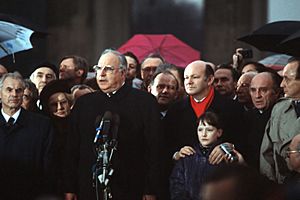
New States Join Germany
On October 3, 1990, East Germany officially joined West Germany. This event is known as the German Reunification. Five new states were created: Brandenburg, Mecklenburg-Vorpommern, Saxony, Saxony-Anhalt, and Thuringia. These new states became part of the Federal Republic of Germany.
Soon after, elections were held in these five new states. The Christian Democratic Union of Germany (CDU) became the biggest party in most of them. The reunified city of Berlin became Germany's capital on October 3, 1990. However, the government stayed in Bonn until 1999.
Kohl's Later Terms
The first national election after reunification happened on December 2, 1990. The CDU won the most votes. On June 20, 1991, the German parliament, called the Bundestag, decided to move the government and central offices from Bonn to Berlin. This is when the term "Berlin Republic" started being used.
In 1994, Roman Herzog, a former judge, was elected President of Germany. He took over from Richard von Weizsäcker. After the 1994 election, Helmut Kohl was reelected as Chancellor for his fifth and final term.
Gerhard Schröder's Time as Chancellor (1998–2005)
First Term (1998–2002)
In the 1998 national election, the ruling parties lost. Gerhard Schröder became Chancellor. He led a government made up of his own party, the Social Democratic Party of Germany (SPD), and The Greens. Joschka Fischer, a leading Green politician, became Vice Chancellor and Foreign Minister.
In 1999, Johannes Rau was elected President of Germany. He had tried to become president for several years. The government also made big changes to taxes in 2000. After 2003, they introduced reforms for social and health policies. Schröder's government also focused on environmental issues, like reducing greenhouse gas.
Germany took part in the NATO action against Yugoslavia in 1999. This was the first time German forces were in combat since World War II. Chancellor Schröder supported the war on terror after the September 11 attacks in the United States. Germany sent forces to Afghanistan and other parts of the world.
In 1999, Germany started using the Euro currency. The Euro completely replaced the old German currency, the Deutsche Mark, in 2002. In 2002, several German cities, like Dresden and Magdeburg, experienced severe flooding.
Second Term (2002–2005)
In the 2002 national election, both the CDU/CSU and the SPD received almost the same number of votes. However, because the Greens did better than the liberal party, Gerhard Schröder's government was reelected.
Germany and France strongly disagreed with the 2003 Iraq War. This led the US government to call Germany and France "Old Europe." However, Germany still supported the United States militarily in other areas, such as the Horn of Africa and Kuwait.
In the early 2000s, Germany faced rising unemployment and an aging population. The government introduced more reforms to deal with these problems. However, the upper house of parliament, the Bundesrat of Germany, had a majority of conservative parties. This meant Schröder's government needed their support to pass new laws.
On May 23, 2004, Horst Köhler was elected President of Germany. He was a former head of the International Monetary Fund and a CDU politician. Köhler quickly became very popular in Germany.
After a big loss for the SPD in a state election in May 2005, Chancellor Schröder asked for a vote of no-confidence in the Bundestag. He felt it was too hard to make needed changes because of the opposition in the upper house and issues within his own party. After losing this vote, President Köhler called for early national elections to be held on September 18, 2005.
Angela Merkel's Time as Chancellor (2005–2021)
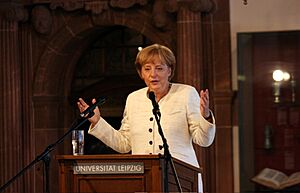
First Term (2005–2009)
The 2005 German federal election resulted in a tie between the two main parties, SPD and CDU/CSU. Neither had enough seats to form a government alone. On November 11, 2005, both parties agreed to form a "grand coalition." Angela Merkel became the leader of this coalition and the first female Chancellor of Germany.
Under Merkel, Germany hosted the G8 summit in 2007. In January 2009, the German government approved a large economic plan. This plan aimed to protect different parts of the economy from a downturn and prevent a rise in unemployment.
Second Term (2009–2013)
In the 2009 German federal election, the CDU/CSU and the FDP won enough votes to form a government together. Angela Merkel continued as Chancellor, leading the Cabinet Merkel II. Guido Westerwelle became the new Vice Chancellor. The Social Democrats had a particularly poor election result.
During this term, major projects included the "energy transition" (Energiewende). This plan aimed for a sustainable energy supply. Other projects included the "Debt Brake" (Schuldenbremse) for balanced budgets, changes to German immigration laws, and high-tech plans for the future of the German economy, known as Industry 4.0.
Third Term (2013–2018)
In December 2013, the "grand coalition" (CDU/CSU and SPD) was formed again, leading to the Third Merkel cabinet. For the first time, the FDP was not in the Bundestag. A new right-wing party, Alternative for Germany (AfD), started winning seats in state parliaments.
Key projects of this second grand coalition under Merkel included laws for a general minimum wage in Germany and various welfare reforms, including pension changes. Projects started in the second term with the FDP were mostly continued.
Germany was greatly affected by the European migrant crisis in 2015. Many people seeking safety from Africa and the Middle East chose Germany as their final destination. The country took in over a million refugees and migrants. Merkel's decision to allow unrestricted entry led to much discussion and criticism both in Germany and across Europe.
Fourth Term (2018–2021)
In 2017, Angela Merkel was elected Chancellor for a fourth term. The FDP returned to the Bundestag, and the right-wing AfD also entered parliament for the first time. In March 2018, Angela Merkel formed another grand coalition with the Social Democrats (SPD). This happened after five months of political difficulty following the September election. Angela Merkel announced during her fourth term that she would not seek another term and planned to retire.
Olaf Scholz's Time as Chancellor (2021–Present)
On December 8, 2021, Social Democrat Olaf Scholz became Chancellor. He formed a "traffic-light coalition" government with the Greens and the FDP. This happened after the SPD won the most votes in the 2021 German federal election.
Frank-Walter Steinmeier was re-elected for a second five-year term as Germany's president. This was a first for an SPD president. He is seen as a symbol of agreement and stability.
Russia's invasion of Ukraine in 2022 and its economic effects greatly influenced Scholz's early policies. Germany's past foreign policy towards Russia was criticized for being too trusting. Scholz's "Zeitenwende speech" (meaning "turning point") three days after the invasion signaled a big shift in Germany's foreign policy. This included billions of dollars in investments for the German military. Scholz also approved direct military and economic help for Ukraine. During a global energy crisis, Scholz promised to reduce Germany's reliance on Russian energy. He stopped the approval of a new gas pipeline from Russia. He also continued Merkel's policy of phasing out nuclear energy. As of April 2023, over 1.06 million refugees from Ukraine were recorded in Germany.
As of December 2023, Germany is the fourth largest economy in the world after the United States, China and Japan and the largest economy in Europe. It is the third largest export nation in the world.




